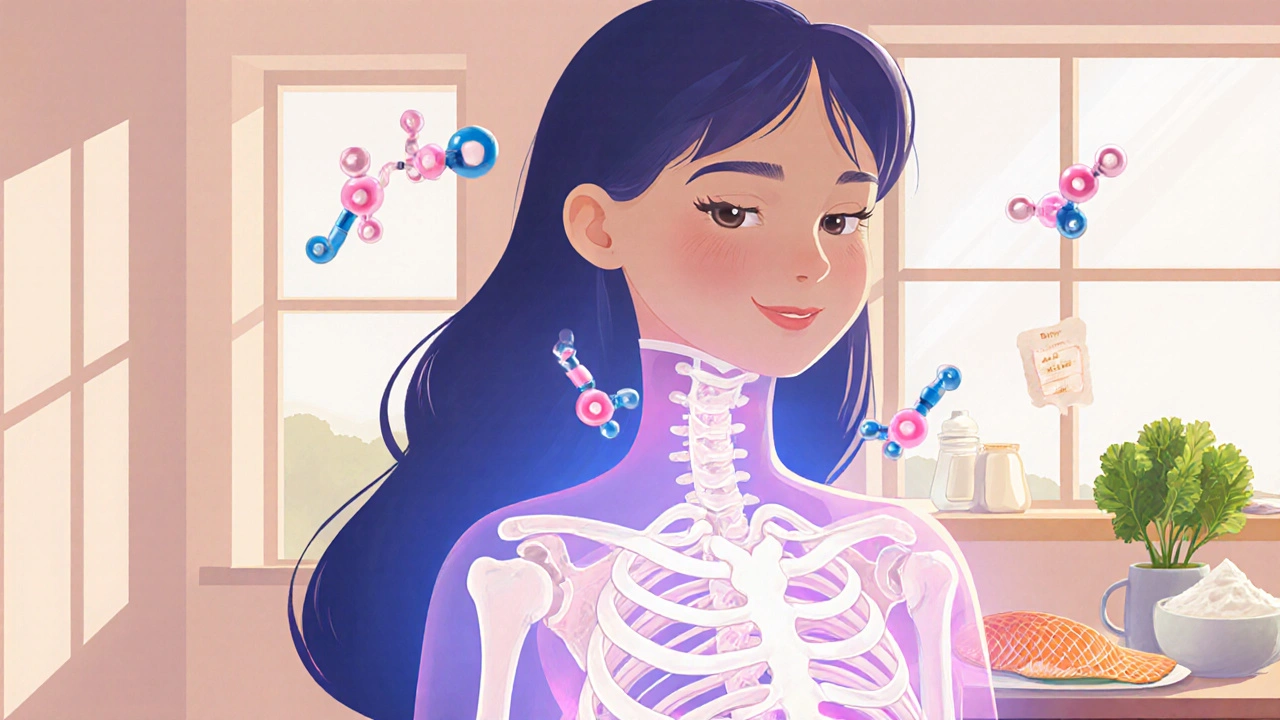 31
Oct,2025
31
Oct,2025
When women start taking birth control pills like desogestrel-ethinyl estradiol, most focus on preventing pregnancy. But there’s another effect happening inside the body-one that doesn’t get talked about enough: what it’s doing to your bones.
What Is Desogestrel-Ethinyl Estradiol?
Desogestrel-ethinyl estradiol is a combination hormonal contraceptive. It contains two synthetic hormones: ethinyl estradiol, a form of estrogen, and desogestrel, a progestin. These work together to stop ovulation, thicken cervical mucus, and thin the uterine lining. It’s sold under brand names like Desogestrel-Ethinyl Estradiol a combined oral contraceptive pill containing desogestrel and ethinyl estradiol, used for birth control and menstrual regulation, and has been on the market since the 1990s.
It’s not just about preventing pregnancy. Many women take it to manage acne, heavy periods, or PMS. But behind those benefits, there’s a quiet conversation happening between these hormones and your skeleton.
Estrogen and Bone Health: The Basic Connection
Your bones aren’t static. They’re constantly being broken down and rebuilt in a process called remodeling. Estrogen plays a key role in slowing down bone breakdown. When estrogen levels drop-like after menopause-bone loss speeds up, leading to osteoporosis.
That’s why postmenopausal women often get estrogen therapy: not just for hot flashes, but to protect their bones. So if you’re taking a pill that contains synthetic estrogen, shouldn’t that help your bones too?
What the Research Says
Studies show that women using desogestrel-ethinyl estradiol tend to maintain or even slightly increase bone mineral density (BMD) compared to those not using hormonal contraception.
A 2021 analysis of over 12,000 women aged 18-35 found that those on combined oral contraceptives had a 1.5% higher BMD in the spine and hip after three years than non-users. The effect was strongest in women under 25, whose bones are still developing.
But here’s the catch: this doesn’t mean the pill prevents osteoporosis later in life. The increase is small and likely temporary. Once you stop taking it, bone density usually returns to baseline within 12-18 months.
One large study from the University of California followed women for 10 years. Those who used combined pills for more than five years before age 30 had a 20% lower risk of hip fracture after age 50-suggesting a long-term protective effect. But that benefit faded if they used the pill for less than two years.
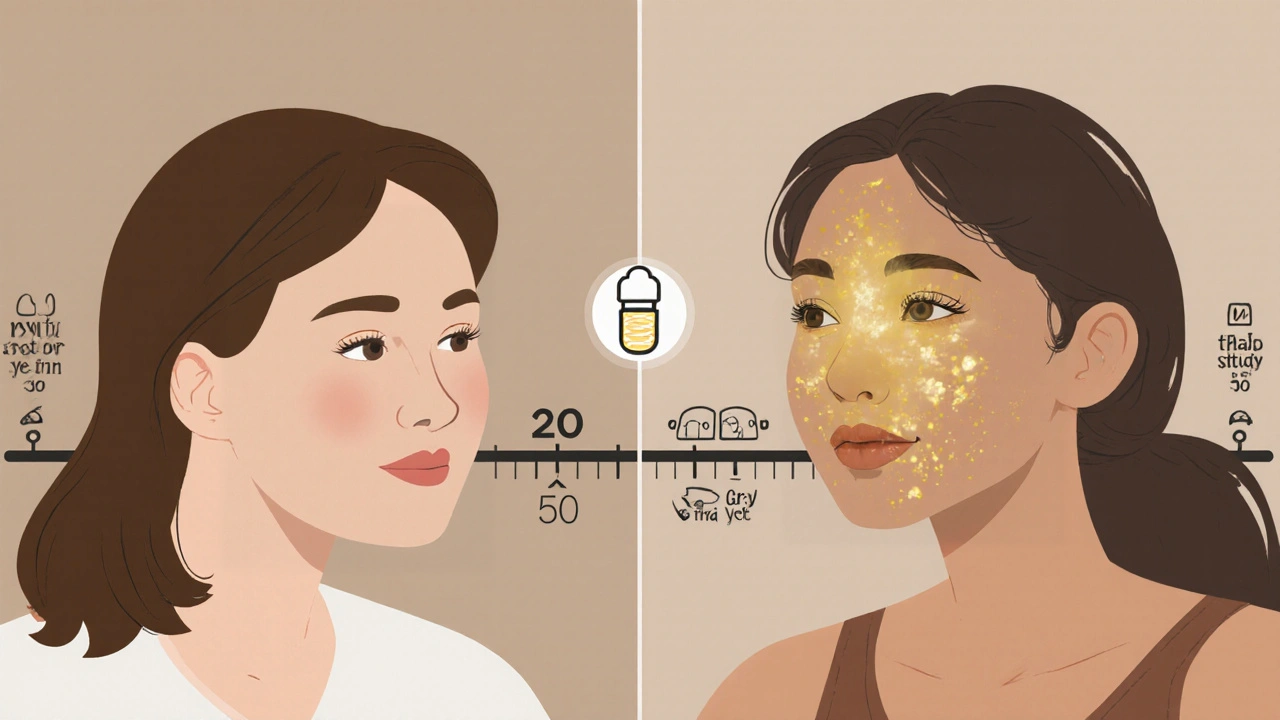
Who Benefits Most?
Not all women experience the same bone effects. The impact depends on age, lifestyle, and baseline bone health.
- Teenagers and young adults (18-25): This is the peak time for building bone mass. Combined contraceptives may help support that process, especially if they’re not getting enough calcium or vitamin D.
- Women with low body weight or eating disorders: Low estrogen from being underweight can hurt bone density. The pill can help stabilize hormone levels and reduce bone loss in these cases.
- Women with amenorrhea: If you’re not getting periods due to stress, exercise, or low body fat, your estrogen is likely low. Desogestrel-ethinyl estradiol can restore estrogen levels and protect bone.
But if you’re over 35, already have low bone density, or smoke, the benefits are much smaller-and the risks may outweigh them.
What About Progestin-Only Pills?
Desogestrel-ethinyl estradiol is a combo pill. But many women switch to progestin-only pills (like the mini-pill or implant) because they can’t take estrogen. Here’s the problem: those pills don’t contain estrogen at all.
Studies show that progestin-only methods may lead to slightly lower bone density over time, especially in young women. One 2023 study found that teens using the etonogestrel implant lost about 1.2% of spine BMD over two years. That’s not a lot-but it’s a trend that raises concern.
If you’re young and choosing contraception, and bone health matters to you, a combined pill might be better than a progestin-only option. But only if you don’t have other risks like migraines with aura or high blood pressure.
What You Can Do to Protect Your Bones
Even if you’re on desogestrel-ethinyl estradiol, you can’t rely on it alone to keep your bones strong. Here’s what actually works:
- Get enough calcium: Aim for 1,300 mg daily if you’re under 18, 1,000 mg if you’re 19-50. Dairy, fortified plant milks, kale, and canned salmon are good sources.
- Take vitamin D: 600-800 IU per day helps your body absorb calcium. Sunlight helps, but most people need a supplement, especially in winter.
- Strength train: Weight-bearing exercise like squats, lunges, and resistance training signals your bones to get stronger. Do it at least twice a week.
- Avoid smoking and too much alcohol: Both interfere with bone formation and increase fracture risk.
- Get tested if you’re at risk: If you’ve had fractures, are underweight, or have a family history of osteoporosis, ask your doctor about a DEXA scan.
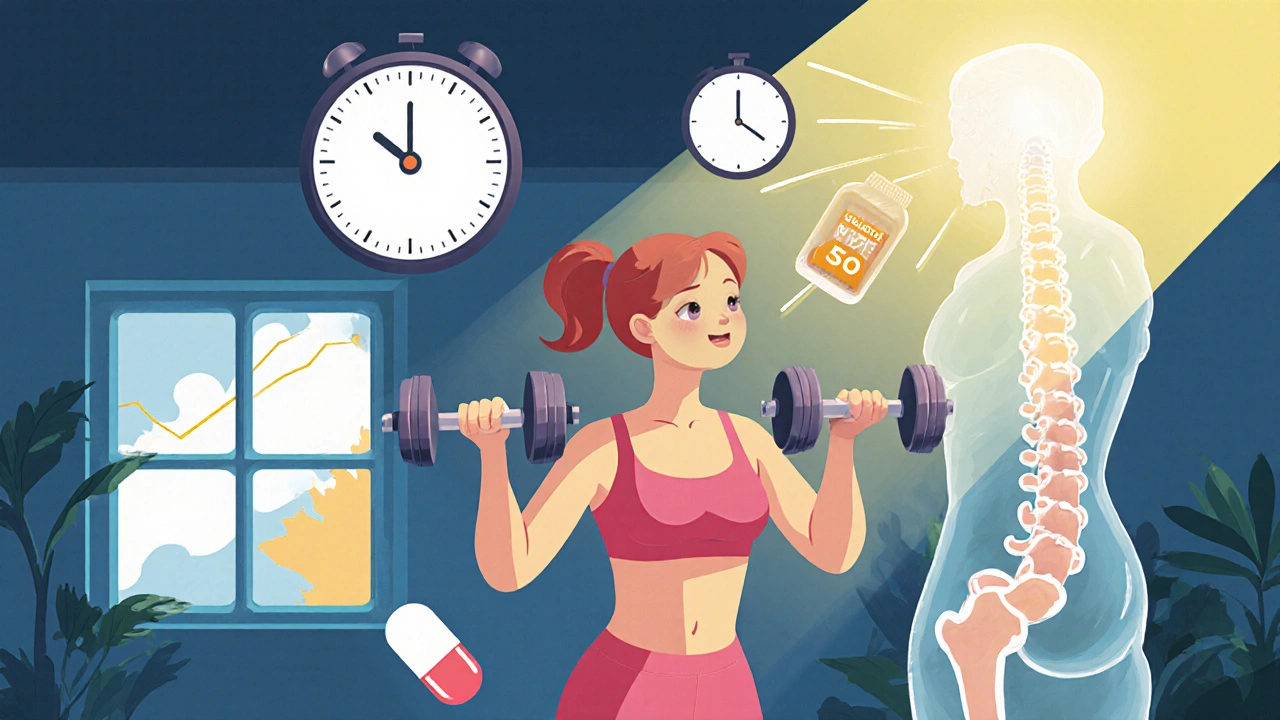
When to Talk to Your Doctor
You don’t need to stop your pill if you’re worried about bone density. But you should talk to your provider if:
- You’re under 20 and have missed periods for more than three months
- You’ve broken a bone from a minor fall
- You’re planning to stop the pill and want to know how it might affect your bones long-term
- You’re considering switching to a progestin-only method and have low body weight or low vitamin D
Your doctor can check your vitamin D levels, review your diet and exercise habits, and help you decide if your current birth control is still the best fit-not just for pregnancy prevention, but for your whole body.
The Bottom Line
Desogestrel-ethinyl estradiol doesn’t make your bones stronger overnight. But for young women, especially those who aren’t getting enough nutrients or exercise, it can help slow bone loss and support peak bone mass. It’s not a magic shield against osteoporosis, but it’s not hurting your bones either.
The real key to strong bones isn’t the pill-it’s what you eat, how you move, and whether you’re getting enough sunlight. The pill might give you a small boost. But you’re the one who builds the foundation.
Does desogestrel-ethinyl estradiol cause bone loss?
No, desogestrel-ethinyl estradiol does not cause bone loss. In fact, studies show it helps maintain or slightly increase bone mineral density in women under 35, especially those with low estrogen levels. The estrogen component helps slow bone breakdown. This effect is temporary and reverses after stopping the pill.
Can birth control prevent osteoporosis?
Combined hormonal contraceptives like desogestrel-ethinyl estradiol may reduce the risk of osteoporosis later in life if used for several years before age 30. But they are not a treatment or prevention method for osteoporosis. Long-term bone health depends more on diet, exercise, and vitamin D than on birth control use.
Is it safe to take desogestrel-ethinyl estradiol if I have low bone density?
If you have low bone density, desogestrel-ethinyl estradiol may be safer than progestin-only options, since it provides estrogen. But it’s not a substitute for proper treatment. Talk to your doctor about calcium, vitamin D, weight-bearing exercise, and whether you need medication like bisphosphonates. Do not rely on birth control alone to treat osteoporosis.
Do progestin-only contraceptives hurt bone density more than combo pills?
Yes, progestin-only methods like the implant or mini-pill may lead to small decreases in bone density over time, especially in teens and young women. This is because they lack estrogen, which helps protect bones. Combined pills like desogestrel-ethinyl estradiol are generally better for bone health in this group-unless estrogen is contraindicated.
How long does it take for bone density to recover after stopping the pill?
Bone density typically returns to pre-pill levels within 12 to 18 months after stopping desogestrel-ethinyl estradiol. If you were building bone mass during your 20s, you likely won’t lose much. But if you were using the pill to replace low natural estrogen, your bone density may drop if you don’t replace those nutrients and habits.
What to Consider Next
If you’re on desogestrel-ethinyl estradiol and thinking about switching, ask yourself: Is this pill helping my bone health, or just preventing pregnancy? If you’re young and active, and you’re eating well and lifting weights, the pill is likely supporting your bones. If you’re over 30, not exercising, and eating a lot of processed food, the pill won’t fix that.
Bone health isn’t about one pill. It’s about decades of habits. Start today. Eat your veggies. Lift something heavy. Get outside. Your future self will thank you.

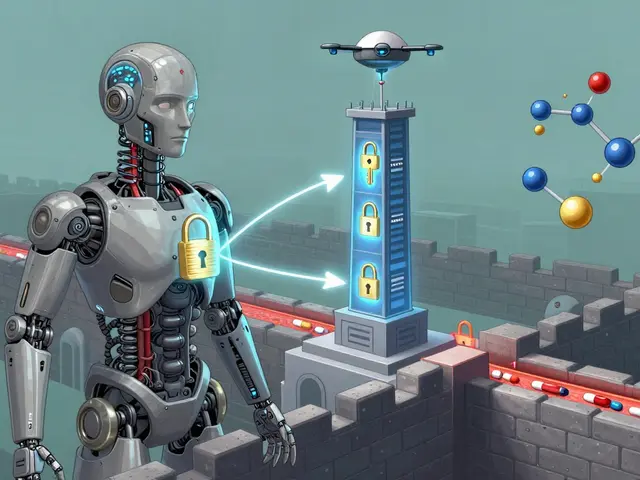


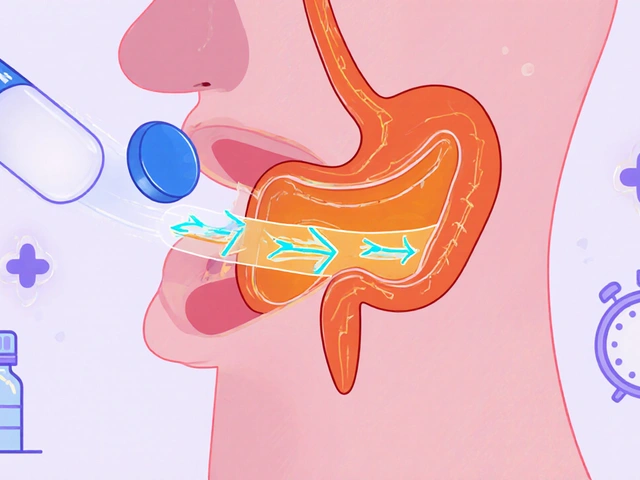
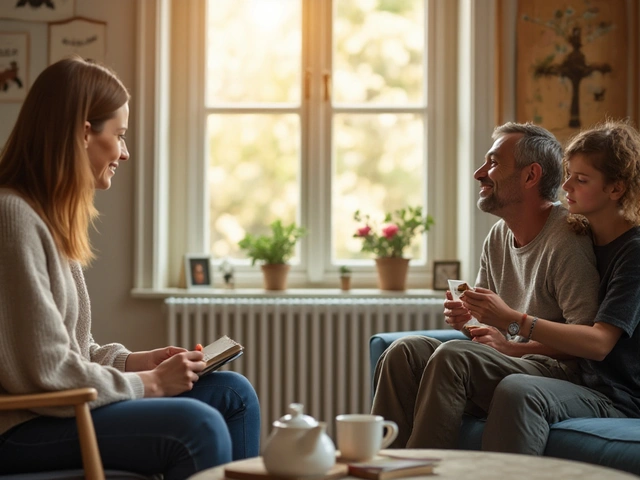
Okay but like… I’ve been on this pill for 6 years and my bones feel stronger than ever? I lift heavy, I drink milk like it’s water, and I don’t get those weird aches I used to get in winter. I don’t know if it’s the pill or just me being a weirdo who cares about her skeleton, but I’m not letting anyone tell me this is useless. 🙌
THIS. So many women are told to just take the pill and not think about it-but your bones are part of your body too. If you’re under 25, this could actually be helping you build lifelong strength. Don’t let anyone make you feel weird for caring about bone density. You’re not overthinking it-you’re being smart. 💪
Let’s be real-this isn’t about birth control. It’s about the patriarchy weaponizing medical advice to make women feel like their bodies are broken unless they’re chemically regulated. The pill gives you a 1.5% BMD bump? That’s not protection-that’s a placebo dressed in lab coats. Meanwhile, real bone health comes from sunlight, squatting heavy things, and not eating processed garbage. But hey, take your little hormone candy and call it science. 🤡
so u mean to say if i m 22 and on this pill and dont eat calcium rich food… my bones still gonna be weak? like… i thought the pill was fixing everything 😅
My cousin broke her wrist falling off a curb at 28 and she’s been on the mini pill for 4 years no estrogen just progestin… now she’s scared to even walk on ice
Have you considered that this entire narrative is being pushed by Big Pharma to keep women dependent on hormonal contraceptives? 🤔 The FDA has approved over 300 estrogen-containing drugs since 1990-yet zero long-term bone studies were mandated. Coincidence? I think not. 🚨
As a woman of color who grew up in a household where dairy was ‘not for us,’ I didn’t know calcium was important until I was 26… and now I’m on this pill, taking supplements, and doing yoga with my mom every morning. It’s not magic-but it’s a start. 💛
I’m a family physician and I’ve seen too many young women stop their pills because they heard ‘hormones are bad’-only to develop amenorrhea and lose bone density. The pill isn’t perfect, but for some, it’s a bridge to better health. Please don’t dismiss it outright. Talk to your provider. Get tested. Take vitamin D. Move your body. Small steps matter.
Of course you’re ‘supporting’ bone density-you’re just masking the real problem: your body isn’t producing estrogen naturally because you’re eating junk and sitting all day. The pill is a band-aid on a broken leg. Stop pretending this is health. It’s just chemical compliance.
It is profoundly tragic that modern medicine has reduced the sacred architecture of the human skeleton to a mere metric of BMD, quantified by DEXA scans and commodified by pharmaceutical marketing. The pill does not ‘protect’-it merely delays the inevitable entropy of biological decay. True skeletal integrity is cultivated through ancestral movement, sunlit rituals, and the rejection of synthetic hormonal governance. We are not machines to be optimized-we are cosmic beings entangled in the dance of time. And yet… you take your little white tablet and call it empowerment? How quaint. 🌌